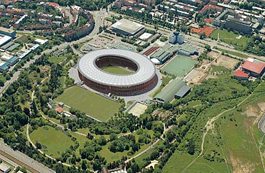
<ODS> Brno may acquire liabilities from the owner along with the properties for the stadium. </ODS>
 |
The two-billion CZK stadium with 30,000 seats is to be built on the site of the old stadium, which has been deteriorating since the beginning of the millennium. The football team Zbrojovka Brno previously won a league title there. The city cannot build the stadium until it resolves disputes with Procházka, who has underground garages, tennis courts, and roads on the city's land. The city has already lost a court case concerning the use of some areas. For example, the roof of the garages serves as a parking lot. Brno's mayor Petr Vokřál (ANO) thus stated that the disputes need to be resolved so that the city does not pay millions unnecessarily. The city is therefore considering several options, from paying money to exchanging nine buildings or a combination of exchanging part of the buildings and paying additional amounts. Procházka demands properties for properties. His assets are estimated at just under 300 million CZK. The city is having assessments prepared.
Vaňková sees a significant risk in the fact that the city would not acquire the actual land, but shares in Procházka's companies. "It may happen that there are debts that are not recorded in the accounting. From long-standing legal practice, I know that acquiring business shares when I only want properties is not a suitable and safe step," Vaňková emphasized.
According to her, it is also not clear whether the city assembly can exchange seven of the nine properties that are managed by the Brno-střed district. The district decided in the assembly that it is against the so-called divestment of the houses and also against their sale. Although the city claims it can do so, Vaňková believes that it is not clear-cut and the case law has not addressed anything like it so far. According to her, it could end up in court.
The possibility of an exchange relates to the buildings on Česká, Masarykova, or Průchodní streets and others in the historic center. Residents recently protested during an assembly meeting. They wanted to buy the houses themselves in the past, but the city did not allow it. People also do not know what will happen to them under the new owner. Vokřál stated that the exchange is just one of the options. If the city were to proceed with it, it would want Procházka to repair the buildings, maintain the contracts with the tenants, and offer alternative housing to those who would not want to stay in the buildings.
The English translation is powered by AI tool. Switch to Czech to view the original text source.
0 comments
add comment
Related articles
0
16.07.2024 | The demolition of the stadium Za Lužánkami in Brno could cost up to 190 million
0
28.04.2021 | Brno succeeded in the dispute over communications on the land behind Lužánky, which belongs to the city
0
19.02.2018 | Petition of ODS against the property exchange in Brno has already 2000 signatures
0
09.01.2018 | Brno will consider exchanging the marketplace for properties obstructing the construction of the stadium
0
12.12.2017 | Brno will not sell apartments in the center to entrepreneur Procházka
0
07.12.2017 | Brno will not exchange residential buildings for land near the stadium, looking for other options
0
07.11.2017 | At the council meeting in Brno, people protested against the exchange for the stadium
0
03.11.2017 | Brno wants to resolve a 13-year dispute over the stadium by exchanging homes
0
31.10.2017 | Brno is considering exchanging houses in the center in order to start the construction of a stadium
0
16.08.2017 | The construction of the football stadium in Brno is undergoing EIA assessment
0
09.03.2016 | Brno will repair the Za Lužánkami stadium, costs will not exceed 2 billion
0
17.07.2015 | Brno wants to renovate the Za Lužánkami stadium for 1.5 billion.
0
07.06.2014 | A sports complex may be created behind Lužánky in Brno, according to a study
1
17.01.2012 | Brno is abandoning the construction of the philharmonic hall; it will strive for stadiums












